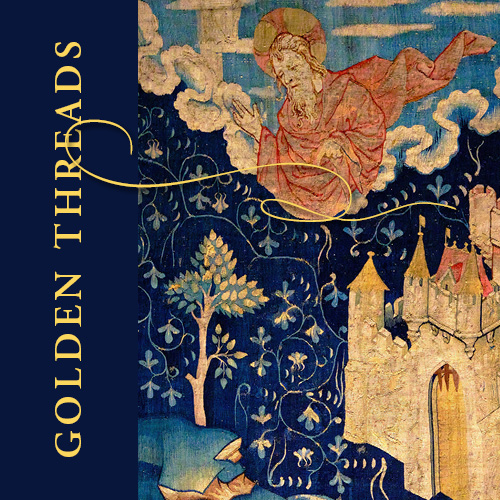Day 19 God Dwells with Us in Jesus
Posted on: March 27, 2025
by: Gerrit Dawson, Senior Pastor
by: Gerrit Dawson, Senior Pastor
Every day, pray aloud worshipfully this golden thread that weaves through the entire tapestry of God’s intent for us.
Behold, the days are coming, declares the LORD,
when I will make a new covenant with the
house of Israel. . . .
I will put my law within them,
and I will write it on their hearts.
And I will be their God, and they shall be my people.
They shall all know me, from the least of them
to the greatest. . . .
For I will forgive their iniquity, and I will
remember their sin no more.
(Jeremiah 31:31, 33-34)
Daily Scripture
John 1:1-5, 14, 18
In the beginning was the Word, and the Word was with God, and the Word was God. He was in the beginning with God. All things were made through him, and without him was not any thing made that was made. In him was life, and the life was the light of men. The light shines in the darkness, and the darkness has not overcome it.
And the Word became flesh and dwelt among us, and we have seen his glory, glory as of the only Son from the Father, full of grace and truth.
No one has ever seen God; the only God, who is at the Father’s side, he has made him known.
Colossians 2:9
For in him the whole fullness of deity dwells bodily.
Picking Up the Thread

Two weeks ago on Day 5, we looked at John 1 in connection with the mystery that God created all things through his Word. And his Word turns out to be Jesus! God has ever existed in a relationship of eternal love between the Father, the Son and the Holy Spirit. In the fullness of the triune God’s “time,” the Father brought forth all things through the Son and in the Spirit. Today we go further in John 1 to discover that the Word entered his own creation as one of us! The ancient promise that God would dwell with his people was realized individually and particularly in the man Jesus.
For centuries, Israel had been awaiting the day of the LORD when God would come to earth to set all things right. Their unwavering hope was that evil would be subdued, the world remade and God could once again dwell with his people. A new age would dawn. I think it was a total surprise that God came so quietly, as a baby born in a little town to a virgin. He fulfilled his promise to dwell with us by actually taking up a flesh-and-blood humanity. The word John uses for “dwelt” could just as easily be translated more religiously as “tabernacled,” giving a connection to the LORD’s presence in the holy temple. Or it could be translated with an earthy feeling of “pitched his tent.” God bivouacked in a body! His dwelling among us was not as a spirit that could be felt but not seen. It was not as a mysterious bush that flamed but never burned up. He came in skin that could be smelled, touched, sunburned and even nailed to a cross like any other ordinary body.
At the same time, our Colossians passage tells us that “the whole fullness of deity” has taken up permanent bodily residence through the incarnation. Jesus is not just a man so holy and faithful that God later adopted him to be his special son. Rather, Jesus came to us from conception as the already Son of God now taking to himself a real body. Yes, he laid aside some of his divine prerogatives in order not to overshadow that humanity. Jesus depended on the Holy Spirit to do as a man what is beyond a man. By the Spirit, he performed miracles or received supernatural insight. But he was ever also the Son of God enacting his divine, eternal faithfulness and love for his Father. The pure heart of his true divinity beat through his true humanity.
In the drama of human history, we discover that we cannot make the story turn out all right. As we saw yesterday, we needed God to come down. And so he did. Jesus the Son of God knew where the narrative needed to go. A human needed to enact unique faithfulness to God even unto death. But only God could accomplish that feat. To turn the human tale from tragedy to comedy, the author entered his own story about us as one of
the characters!
Jesus, inside our story, risked being co-opted, subverted or taken over by his fellow humans and their dysfunction. Of course, he remained faithful, but he was killed by the other characters in the narrative. In our world, Jesus trusted the heavenly script that would lead through his grim death to his joyful living again. So all the characters could, if they trusted him, have their personal stories redeemed. Now Jesus, the “author and finisher of our faith” (Hebrews 12:2 KJV), continues by his Spirit to rewrite the story of each person that calls upon him. And, as Paul celebrated, “He who calls you is faithful; he will surely do it” (1 Thessalonians 5:24).
Stitching It In
I love realizing that the incarnation was not a temporary state for the Son of God. He wasn’t just slumming with humanity for a few years. Taking up a real humanity was a decision that will last eternally! Jesus remains forever wedded to us through his resurrection body that has been transformed and outfitted for everlasting life. This is the pledge and preview of the embodied life we can expect in Christ. As Paul writes, Christ “will transform our lowly body to be like his glorious body” (Philippians 3:21). Jesus will forever be fully divine and fully human. And we who are joined to him by the Spirit through faith can expect to receive all that he has received in resurrection.
Our humanity has been taken into the triune life into eternity. Think how much this means he wants us—enough to include us always! We image bearers who fell from grace will be restored to a glory surpassing what our first parents had in Eden! Think how he values us that he would desire that we are to be wedded to him always. No wonder Scripture speaks of Christ as the bridegroom and the church as his bride (Ephesians 5:32, Revelation 19:7).
I love the thought that even if there had been no sin, God would still have become incarnate (Thomas Aquinas, Summa Theological, Pt. 3, Q.1). He always intended such a close union. He came not only to undo our sin, but he came for love of us. He wants us with him now and always. He does not disdain our bodies even in our frail state. He cherishes the flesh of his bride both now and in the resurrected state. He knows how it is with us, and he cares. He feels in his own body our joys and sorrows, our creations and our losses. He sets his desire upon us; we are the apple of his eye (Psalm 17:8).
Praying Along the Pattern
Lord Jesus, Son of Mary, Son of the Father,
You are the joy of our desiring.
Humanity longs for you to dwell with us.
And you came!
You came as this man and not another.
You came in the fullness of time, and not another.
You came saying these words and not others.
You came to live, die and live again,
In faithfulness, cross and resurrection.
There could be no other way.
Lord Jesus, no one has seen the Father,
But you came from his side,
And you have made him known.
Seeing you in Scripture by the Spirit,
I see all the way to the heart of God.
I discover that you have joined yourself
To your bride the church forever.
This day I will go forth beaming
In assurance of such love
That you dwell with us as man forever.
Posted in:
Lent




 Close
Close












